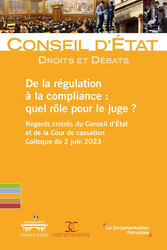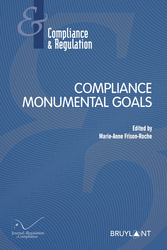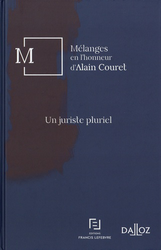Thesaurus : Doctrine

Référence complète : Terré, F., Concurrence et proportionnalité, in Parléani, G. (coord.), Mélanges en l'honneur du Professeur Claude Lucas de Leyssac, LexisNexis, novembre 2018, pp.467-471.
____
Lire une présentation générale des Mélanges dans lesquels l'article a été publié.
____
Thesaurus : Doctrine

► Full Reference: Segonds, M., Compliance, Proportionality and Sanction. The example of the sanctions taken by the French Anticorruption Agency, in Frison-Roche, M.-A. (ed.),Compliance Monumental Goals, series "Compliance & Regulation", Journal of Regulation & Compliance (JoRC) and Bruylant, to be published.
___
► Article Summary: Before devoting the developments of his article to the sole perspective of sanctions imposed under "Anti-corruption Compliance", the author recalls in a more general way that, as is the sanction, Compliance is in essence proportional: Proportionality is inherent to Compliance as it conditions any sanction, including a sanction imposed under Compliance.
This link between Proportionality and Compliance has been underlined by the French Anti-Corruption Agency (Agence française anticorruption - AFA) with regard to risk mapping, which must measure risks to arrive at effective and proportional measures. This same spirit of proportionality animates the recommendations of the AFA which are intended to apply according to the size of the company and its concrete organisation. It governs sanctions even more, in that punitive sanctions refer on one hand to Criminal Law, centered on the requirement of proportionality. Punitive sanctions It governs sanctions even more, in that punitive sanctions refer on the other hand to the disciplinary power of the manager who, from other sources of law, must integrate the legal requirement of proportionality when he/she applies external and internal compliance norms.
____
_______
April 4, 2024
Publications

🌐follow Marie-Anne Frison-Roche on LinkedIn
🌐subscribe to the Newsletter MAFR Regulation, Compliance, Law
____
► Full Reference: M.-A. Frison-Roche, "Le rôle du juge dans le déploiement du droit de la régulation par le droit de la compliance" ("Synthesis: The role of the Judge in the deployment of Regulatory Law through Compliance Law"), Synthesis in Conseil d'État (French Council of State) and Cour de cassation (French Court of cassation), De la régulation à la compliance : quel rôle pour le juge ? Regards croisés du Conseil d'Etat et de la Cour de cassation - Colloque du 2 juin 2023, La Documentation française, "Droits et Débats" Serie, 2024, pp.
____
____
🚧read the bilingual Working Paper which is the basis of this article, with additional developments, technical references and hyperlinks
____
► Presentation of this concluding article: It is remarkable to note the unity of conception and practice between professionals who tend to work in administrative jurisdictions and professionals who tend to work in judicial jurisdictions: they all note, in similar terms, an essential movement: what Regulatory Law is, how it has been transformed into Compliance Law, and how in one and even more so in the other the Judge is at the centre of it.
Judges, as well as Regulators and European officials, explain this and use different examples to illustrate the far-reaching changes it brings to the Law and to the companies responsible for increasing the systemic effectiveness of the rules through the practice and dissemination of a Culture of Compliance.
The role of the judge participating in this Ex Ante transformation is renewed, whether he/she is a judge of Public Law or a judge of Private Law, in a greater unity of the legal system.
____
► English Summary of this article: The tug-of-war between 'Compliance' and 'conformity', which is exhausting us, obscures what is essential, i.e. the great novelty of a branch of law that assumes a humanist vision expressing the ambition to shape the future so that it is not catastrophic (preventing systems from collapsing), or even better (protecting human beings in these systems).
The article begins by describing the emergence of Compliance Law, as an extension of Regulatory Law and going beyond it. This new branch of law takes account of our new world, brings its benefits and seeks to counter these systemic dangers so that human beings could be their beneficiaries and are not crushed by them. This branch of Ex Ante Law is therefore political, often supported by public Authorities, such as Regulatory Authorities, but today it goes beyond sectors, as shown by its cutting edge, the Obligation of Vigilance.
The "Monumental Goals" in which Compliance Law is normatively anchored imply a teleological interpretation, leading to an "empowerment" of the crucial operators, not only States but also companies, responsible for the effectiveness of the many new Compliance Tools.
The article goes on to show that Judges are increasingly central to Compliance Law. Lawsuits are designed to make companies more accountable. In this transformation, the role of the judge is also to remain the guardian of the Rule of Law, both in the protection of the rights of the defence and in the protection of secrets. Efficiency is not what defines Compliance, which should not be reduced to a pure and simple method of efficiency, which would lead to being an instrument of dictatorship. This is why the principle of Proportionality is essential in the judge's review of the requirements arising from this so powerful branch of Law.
The courts are thus faced with a new type of dispute, of a systemic nature, in their own area, which must not be distorted: the Area of Justice.
____
📝read article (in French)
________
Updated: March 15, 2023 (Initial publication: Oct. 14, 2021)
Publications

► Full Reference: M.-A. Frison-Roche, " Definition of Proportionality and Definition of Compliance Law", in M.-A. Frison-Roche (ed.), Compliance Monumental Goals, series "Compliance & Regulation", Journal of Regulation & Compliance (JoRC) and Bruylant, 2023, p.
___
► Article Summary: The use of Proportionality t always limit powers is only justified when it is about sanctions, but sanctions are only one tool among others in Compliance Law, intended moreover to have little place in this Ex Ante branch of Law. And returning to the very nature of Compliance Law, which relies on operators, private or public, because they are powerful, then using proportionality to limite powers is detrimental to Compliance Law.
However, nothing requires that. Compliance Law is not an exception that should be limited. On the contrary, it is a branch of Law which carries the greatest principles, aimed at protecting human beings and whose Normativity lies in its "Monumental Goals": detecting and preventing future major systemic crisis (financial, health and climate ones).
However, literally the principle of Proportionality is: "no more powers than necessary, as many powers as necessary".
The second part of the sentence is independent of the first: this must be used.
Politics having fixed these Monumental Goals, the entity, in particular the company, must have, even tacitly, "all the necessary powers" to achieve them. For example, the power of vigilance, the power of audit, the power over third parties. Because they are necessary to fulfill the obligations that these "crucial operators" must perform as they are "in a position" to do so.
So instead of limiting the powers, the Principe of Proportionality comes to support the powers, to legitimize them and to increase them, so that we have a chance that our future is not catastrophic, perhaps better.
In this respect, Compliance Law, in its rich Definition, will itself have enriched the Principle of Proportionality.
____
🚧read the Working Paper, with technical developments, references, and hypertext links.
____
📘go to the general presentation of the book in which this article is published
____
► read the presentations of the other Marie-Anne Frison-Roche's contributions in this book:
📝Compliance Monumental Goals, beating heart of Compliance Law,
📝 Role and Place of Companies in the Creation and Effectiveness of Compliance Law in Crisis,
📝 Assessment of Whistleblowing and the duty of Vigilance
________
March 15, 2023
Thesaurus : Doctrine

► Full Reference: A. Mendoza-Caminade, "Proportionality and Evaluation. The Example of Intellectual Property Law", in M.-A. Frison-Roche (ed.), Compliance Monumental Goals, coll. "Compliance & Regulation", Journal of Regulation & Compliance (JoRC) and Bruylant, 2023, p. 221-236.
____
📘read a general presentation of the book, Compliance Monumental Goals, in which this article is published.
____
► Summary of the article:
________
Updated: March 15, 2023 (Initial publication: May 18, 2021)
Publications

► Full Reference: M.-A. Frison-Roche, "Place and rôle of Companies in the Creation and Effectiveness of Compliance Law in situation of crisis", in M.-A. Frison-Roche (ed.), Compliance Monumental Goals, series "Compliance & Regulation", Journal of Regulation & Compliance (JoRC) and Bruylant, 2023, p.
____
► Article Summary: This article has a very topic: the place of private Companies, regarding the chapter's issue: "the ordeal of a crisis". The crisis constitutes a "test", that is to say, it brings evidence. Let us take it as such.
Indeed, during the health crisis, Companies have helped the Public Authorities to resist the shock, to endure and to get out of the Crisis. They did so by force, but they also took initiatives in this direction. From this too, we must learn lessons for the next crisis that will come. It is possible that this has already started in the form of another global and systemic crisis: the environmental crisis. In view of what we have been able to observe and the evolution of the Law, of the standards adopted by the Authorities but also by the new case law, what can we expect from Companies in the face of this next Crisis, willingly and strength?
____
🚧Read the bilingual Working Paper, with more developments, technical references, and hypertext links.
____
____
► read the presentations of the other Marie-Anne Frison-Roche's contributions in this book:
📝Compliance Monumental Goals, beating heart of Compliance Law,
📝Definition of Principe of Proportionality and Definition of Compliance Law,
📝 Assessment of Whistleblowing and the duty of Vigilance
________
.
Feb. 2, 2023
Thesaurus : Doctrine

► Full Reference: O. Douvreleur, "Compliance et juge du droit" ("Compliance and Judge ruling only on points of Law"), in M.-A. Frison-Roche (ed.), La juridictionnalisation de la Compliance, coll. "Régulations & Compliance", Journal of Regulation & Compliance (JoRC) and Dalloz, 2023, p. 465-471.
____
📕read a general presentation of the book, La juridictionnalisation de la Compliance, in which this article is published
____
► Summary of the article (done by the Journal of Regulation & Compliance): Compliance maintains with the judge complex relations, and even more with the judge ruling only on points of Law (in France, the Court de Cassation in the judicial order, the one who, in principle, does not know the facts that he leaves to the sovereign appreciation of the judges ruling on the substance of the disputes. At first glance, compliance is a technique internalised in companies and the place occupied by negotiated justice techniques leave little room for intervention by the judge ruling only on points of Law
However, his role is intended to develop, in particular with regard to the duty of vigilance or in the articulation between the different branches of Law when compliance meets Labor Law, or even in the adjustment between American Law and the other legal systems, especially French legal system. The way in which the principle of Proportionality will take place in Compliance Law is also a major issue for the judge ruling only on points of Law.
________
Sept. 22, 2022
Interviews

♾️suivre Marie-Anne Frison-Roche sur LinkedIn
♾️s'abonner à la Newsletter MAFR Regulation, Compliance, Law
____
► Référence complète : M.-A. Frison-Roche, "Focus sur les Buts Monumentaux de la Compliance", entretien avec Marina Brillié, Dalloz - Actu Étudiants, 22 septembre 2022.
___
💬 Lire l'entretien sur le site
____
► Présentation de l'entretien par le journal : "Décrire et concevoir ses Buts Monumentaux permet d’anticiper un Droit de la Compliance, toujours plus puissant, encadrant et encadré ». Alors que vient de paraître le livre essentiel pour appréhender ce qui régule et codifie par charte, mais aussi ce qui passe par les accords internationaux et les contrats, pour lutter contre la corruption ou la haine en ligne, comme pour favoriser la protection des données personnelles ou la bonne gestion des risques, nous avons la chance d’interviewer celle qui a proposé cette notion de « buts monumentaux » de la Compliance dès 2016, la coéditrice et directrice scientifique de la série Régulations & Compliance, Marie-Anne Frison-Roche, agrégée des Facultés de Droit, directrice du Journal of Regulation & Compliance (JoRC)."
► Questions posées :
- Pourquoi définir des buts monumentaux à la Compliance ?
- Quel pourrait être le rôle du principe de proportionnalité dans la réalisation de ces Buts ?
- En quoi la concurrence et la Compliance sont-elles liées ?
- Comment aborder la Compliance sur les territoires européens ?
________
Sept. 1, 2022
Thesaurus : Doctrine

► Full Reference: L. Meziani, "Proportionnalité en compliance, garant de l’ordre public en entreprise" ("Proportionality in Compliance, the guarantee of public order in companies"), in M.-A. Frison-Roche (ed.), Les Buts Monumentaux de la Compliance, coll. "Régulations & Compliance", Journal of Regulation & Compliance (JoRC) and Dalloz, 2022, p. 225-230.
____
📕read a general presentation of the book, Les Buts Monumentaux de la Compliance, in which this article is published
____
► Summary of the article (done by the Journal of Regulation & Compliance): The author emphasizes the part that companies take not only in the application of Compliance mechanisms but also in their establishment, as soon as Proportionality, a mechanism that guarantees public order, is respected. It emphasizes the link between Compliance and Ethics, since the company is directly in charge of the people who work for it and in its name, the company being a way of social integration. The way in which the company organizes itself so that the people within it are treated fairly is a major factor in an effective Compliance culture.
________
Sept. 1, 2022
Publications

♾️ follow Marie-Anne Frison-Roche on LinkedIn
♾️ subscribe to the Newsletter MAFR Regulation, Compliance, Law
____
► Full Reference: M.-A. Frison-Roche, "Définition du principe de proportionnalité et définition du Droit de la Compliance" ("Definition of the Proportionality principle and definition of Compliance Law"), in M.-A. Frison-Roche (ed.), Les Buts Monumentaux de la Compliance, coll. "Régulations & Compliance", Journal of Regulation & Compliance (JoRC) and Dalloz, 2022, p. 245-271.
____
📝read the article (in French)
____
🚧read the bilingual Working Paper which is the basis of this article, with additional developments, technical references and hyperlinks
____
📕read a general presentation of the book, Les Buts Monumentaux de la Compliance, in which this article is published
____
► Summary of the article (done by the Journal of Regulation & Compliance): The use of Proportionality always limiting powers is only justified when it is about sanctions, but sanctions are only one tool among others in Compliance Law, intended moreover to have little place in this Ex Ante branch of Law. And returning to the very nature of Compliance Law, which relies on operators, private or public, because they are powerful, then using proportionality to limite powers is detrimental to Compliance Law.
However, nothing requires that. Compliance Law is not an exception that should be limited. On the contrary, it is a branch of Law which carries the greatest principles, aimed at protecting human beings and whose Normativity lies in its "Monumental Goals": detecting and preventing future major systemic crisis (financial, health and climate ones).
However, literally the principle of Proportionality is: "no more powers than necessary, as many powers as necessary".
The second part of the sentence is independent of the first: this must be used.
Politics having fixed these Monumental Goals, the entity, in particular the company, must have, even tacitly, "all the necessary powers" to achieve them. For example, the power of vigilance, the power of audit, the power over third parties. Because they are necessary to fulfill the obligations that these "crucial operators" must perform as they are "in a position" to do so.
So instead of limiting the powers, the Principe of Proportionality comes to support the powers, to legitimize them and to increase them, so that we have a chance that our future is not catastrophic, perhaps better.
In this respect, Compliance Law, in its rich Definition, will itself have enriched the Principle of Proportionality.
________
Sept. 1, 2022
Thesaurus : Doctrine

► Référence complète : M. Segonds, "Compliance, proportionnalité et sanction" ("Compliance, proportionality and sanction"), in M.-A. Frison-Roche (ed.), Les Buts Monumentaux de la Compliance, coll. "Régulations & Compliance", Journal of Regulation & Compliance (JoRC) and Dalloz, 2022, p. 231-244.
____
📕read a general presentation of the book, Les Buts Monumentaux de la Compliance, in which this article is published
____
► Summary of the article (done by the Journal of Regulation & Compliance): Before devoting the developments of his article to the sole perspective of sanctions imposed under "Anti-corruption Compliance", the author recalls in a more general way that, as is the sanction, Compliance is in essence proportional: Proportionality is inherent to Compliance as it conditions any sanction, including a sanction imposed under Compliance.
This link between Proportionality and Compliance has been underlined by the French Anti-Corruption Agency (Agence française anticorruption - AFA) with regard to risk mapping, which must measure risks to arrive at effective and proportional measures. This same spirit of proportionality animates the recommendations of the AFA which are intended to apply according to the size of the company and its concrete organisation. It governs sanctions even more, in that punitive sanctions refer on one hand to Criminal Law, centered on the requirement of proportionality. Punitive sanctions It governs sanctions even more, in that punitive sanctions refer on the other hand to the disciplinary power of the manager who, from other sources of law, must integrate the legal requirement of proportionality when he/she applies external and internal compliance norms.
________
Updated: Sept. 1, 2022 (Initial publication: Oct. 14, 2021)
Thesaurus : Doctrine

► Full Reference: L. Rapp, "Conformité, proportionnalité et normativité" ("Compliance, proportionality and normativity"), in M.-A. Frison-Roche (ed.), Les Buts Monumentaux de la Compliance, coll. "Régulations & Compliance", Journal of Regulation & Compliance (JoRC) and Dalloz, 2022, p. 177-198.
____
📕read a general presentation of the book, Les Buts Monumentaux de la Compliance, in which this article is published
____
► Summary of the article (done by the Author): Proportionality is to the exercise of powers what subsidiarity is to the exercise of competences: an indicator as well as a limit. It determines the scope and allows for control at the same time. It sets the standard, before being a standard itself. This may explain why, in principle, it is part of the judge's office and his methods of assessment. But a study of its recent evolution shows that it is gradually moving from the ex-post to the ex-ante, which makes it possible to anticipate that it will soon become an effective tool of compliance policies and a useful normative reference. The article developments demonstrate this, by explaining how one slides from the principle of proportionality to proportionality control, from proportionality control to proportional reasoning, from proportional reasoning to compliance control, and finally, in a last desirable evolution, from compliance control to the necessary proportionality of control.
________
July 12, 2022
Thesaurus : 02. Cour de cassation
Référence complète : Crim., 12 juillet 2022, pourvoi n° 21-83.820 (publié au bulletin).
____
_____
May 18, 2022
Thesaurus : Doctrine

► Full Reference: Meziani, L., Ch., Proportionality in Compliance, the guarantee of public order in companies, in Frison-Roche, M.-A. (ed.), Compliance Monumental Goals, series "Régulations & Compliance", Journal of Regulation & Compliance (JoRC) and Bruylant, to be published.
___
► Article Summary (done by the Journal of Regulation & Compliance): The author emphasizes the part that companies take not only in the application of Compliance mechanisms but also in their establishment, as soon as Proportionality, a mechanism that guarantees public order, is respected. It emphasizes the link between Compliance and Ethics, since the company is directly in charge of the people who work for it and in its name, the company being a way of social integration. The way in which the company organizes itself so that the people within it are treated fairly is a major factor in an effective Compliance culture.
____
📘go to the general presentation of the book in which this article is published.
________

July 22, 2021
Publications

 ►Full reference: Frison-Roche, M.-A., Definition of Principe of Proportionality and definition of Compliance Law, Working Paper, July 2021.
►Full reference: Frison-Roche, M.-A., Definition of Principe of Proportionality and definition of Compliance Law, Working Paper, July 2021.
____
🎤 this Working Paper is the basis for a conference in the colloquium Compliance and Proportionality. From the control of Proportionality to the proportionality of the control, to be helded in Toulouse, France, on the 14th October 2021.
📝It constitutes the basis for an article:
📕 this article will be published in its French version in the book Les buts monumentaux de la Compliance, in the Series 
📘 in its English version in the book Compliance Monumental Goals, in the Series 
____
► Working Paper Summary: Measuring the relationship between the Principle of Proportionality and Compliance Law depends entirely on the Definition chosen for Compliance Law. Let us first take the definition of Compliance Law as a simple "mode of effectiveness" of the rules to which we hold (I). The more we stick to this procedural definition of Compliance Law as a mode of effectiveness of the rules, the less it is easy to detect specificities in the application of the Principle of proportionality in compliance mechanisms. There are certainly many examples of the application of the principle of proportionality, but the addition and variety of examples are not enough to sculpt an original relationship between Proportionality and Compliance.
However, this exercise is not wasted. In fact, in the confusion which still marks the emergence of Compliance Law, the legal nature of the compliance mechanisms remains contested. However, the imposition of Proportionality, not only as it is an obligation but as a limitation of powers in this first definition focusing on Efficiency, recalls that Compliance, conceived as " process ", would then in any case be admissible at the very least as a" Procedure ", anchored in the Rule of Law Principle, therefore self-limititation expression. But Proportionality is then like a cold shower in compliance, since it is defined by self-limitation in a Law which would be defined by effectiveness as its only definition... Ineffectiveness In Efficiency...: it is no longer a relation, it is then an opposition which is established between the two terms ...
In this definition of Compliance Law, there is no other choice than to put process in this sort of squaring circle because in this procedural Compliance Definition, as a method of effectiveness, of effectiveness and efficiency of the rules estimated more important more than others, it must however be admitted that Compliance Law, as any branch of the Law, without denying its very legal nature, must be anchored in the Rule of Law Principle.
By the principle of proportionality, this new branch of Law is forced to anchor classic solutions from Constitutional, Public or Criminal Law, the Principle of Proportionality prohibiting the Compliance of be just a process. The Repression Law has a large part in this conception and the Proportionality Principle reminds it of the part that Criminal Law still takes (with difficulty and for the moment ...) in the admission of ineffectiveness that the Law demands, particularly in the face of Compliance technologies.
In this first definition, the Proportionality Principle thus reminds Compliance, entirely held in the idea of Efficiency that it is a "Law" of Compliance" and anchored in the Rule of Law Principle, it must limit its Effectiveness . It is therefore a kind of "price" that these techniques pay, with regret ..., to the Rule of Law and in particular to the freedoms of human beings. There is a strong temptation not to want to pay this price. For example by affirming that there is a new technological world, which the new system, entirely in algorithms, will promote in a move away from the Law, rejected towards the Old World. Frequently proposed, or set up for instance in China. Others say that we must "do the balance". But when you balance Efficiency performance and Efficiency self-limitation, you know very well who will win ...
But why not look rather on the side of a Definition of Compliance Law where, on the contrary, the two concepts, instead of opposing each other, support each other!
Indeed, Compliance Law is then defined as an extension of Regulatory Law as a set of rules, institutions, principles, methods and decisions taking their meaning and normativity for specific Goals. . In this definition, which is both specific and substantial, these "Monumental Goals" are systemic and require that all means be mobilized for them to be achieved. Future and negative in nature (events that must not happen) but also future and positive in nature (events that must occur), Compliance Law does not apply to all the rules whose effectiveness required, but this specific type of "Monumental Goals", in an alliance between the political authorities in charge of the future of human groups and the entities in a position to mobilize its means. The method is then different. It is no longer a question of entrenching and the prospect of repression fades into the background.
A reversal occurs. Proportionality ceases to be what limits Efficiency to become what increases Efficiency. As soon as Goals have be precised, Proportionality is not the consequence of the limitation (as in the principle of "necessity" of Criminal Law, insofar as the latter is an exception), it is the consequence of the fact that any legal mechanism is a "Compliance Tool", which only has meaning in relation to a "Monumental Goal". It is therefore essential to set the "Goal Monumental Goals". As this is where the legal normativity of Compliance is housed, the control must first and foremost relate to that. Then all the Compliance Tools must adjust in a "proportionate way", that is to say effective to its goals: as much as it is necessary, not more than it is necessary. According to the principle of economy (which is also called the "principle of elegance" in mathematics).
In consequence, the rule contrary to the Principle of Proportionality is: the rule useless to achieve the goal. The unnecessary rule is the disproportionate rule: this is how the judicial review of excessive sanctions should be understood, not by the notion of "the limit" but not by the notion of "the unnecessary".
Everything then depends on the legal quality of the goal. De jure - and this would deserve to be a requirement at constitutional level, the goal must always be clear, understandable, non-contradictory, attainable.
This increases the office of the Judge. This renews the power of the Legislator in a conception which ceases to be discretionary.
But the Legislator retains the prerogative of determining the Monumental Goals, while the Judge controls the quality of the formulation that he makes of them, in order to be able to measure the proportionality of the means which are put in front by the State and the Companies, while Companies can rally to the Monumental Goals of the Politics by making an alliance with them, but certainly not instituting others in an autonomous way because they are not normative political entities, whereas they are free to determine the means necessary to achieve these goals, the Judge controlling the proportionality mechanism that makes this new system work.
The case law of the German Constitutional Court expresses this conception. It is fully consistent with what Compliance Law is in what is the one Monumental Goal containing all the systemic Monumental Goals: the protection of the human being.
_____________
June 3, 2021
Thesaurus : Doctrine
Dec. 9, 2020
Thesaurus : Doctrine

Référence complète : Dezeuze, E. , La proportionnalité des sanctions administratives en matière économique et financière, in Mélanges en l'honneur d'Alain Couret, Un juriste pluriel, Editions Francis Lefebvre et Dalloz, 2020, pp.683-701.
Consulter la présentation générale de l'ouvrage dans lequel cet article a été publié.
May 22, 2020
Thesaurus : Doctrine
Full reference: Support, A., "La refondation de l'Europe ne pourra se faire sans sortir des traités actuels" ("The refoundation of Europe cannot be done without leaving the current treaties"), column in Le Figaro, 22nd of May 2020
Read Alain Supiot's column (in French)
In this column, Alain Supiot underlines the opportunity offered by the judgment of the Court of Karlsruhe of May 5, 2020 concerning the proportionality of the unconventional monetary measures adopted by the ECB.
May 8, 2020
Thesaurus : Doctrine
Full reference: Pistor, K., Germany Constitutional Court Goes Rogue, Project Syndicate, 8th of May 2020
Dec. 1, 2019
Thesaurus : Doctrine
► Référence complète : De Backer, N., « Le principe de proportionnalité à l’épreuve de la liberté d’expression numérique », J.E.D.H., 2019/4, p. 243-277.
____
Dec. 1, 2019
Thesaurus : Doctrine
► Référence complète : De Backer, N., « Le principe de proportionnalité à l’épreuve de la liberté d’expression numérique », J.E.D.H., 2019/4, p. 243-277.
____
Nov. 15, 2017
Thesaurus : Doctrine
► Référence complète : Le Gac-Pech, S., Le nouvel art de juger : quand la proportionnalité s'invite dans la mise en œuvre de la règle de droit, Revue Lamy Droit civil, nº 153, 2017.
Oct. 24, 2017
Thesaurus : Doctrine
Jan. 18, 2017
Thesaurus
Référence complète : Gaudemet, Y., La régulation économique ou la dilution des normes, Revue de droit public, p.23 et s.
Les étudiants de Sciences po peuvent lire l'article via le drive de Sciences po dans le dossier "MAFR - Régulation"
Dans cet article critique, Yves Gaudemet affirme que le Droit de la Régulation économique illustre le phénomène plus général de la "dilution des normes, phénomène auquel est consacré le dossier ici consacré par la Revue de Droit public au "Désordre normatif".
Il estime que le Droit de la Régulation économique l'illustre en ce qu'il fait subir aux normes une sorte de "dilution".
Cela tient tout d'abord au vocabulaire, où règne ce qu'il qualifie le "désordre des mots", affectant la sécurité juridique. Le "Droit souple" est le moyen d'une "régulation bavarde", faite de proclamations, de recommandations et de lignes directrices.
Le juge devient alors le "régulateur ultime", puisqu'il applique à ce Droit souple un contrôle de proportionnalité.
Les "actes de régulation" eux-mêmes sont dilués entre eux, puisque les Autorités peuvent les utiliser d'une façon alternée, les pouvoirs s'appuyant les uns sur les autres, notamment le pouvoir de sanction, avec une "utilisation indifférenciée par les autorités de régulation des nombreux outils qu'elles ont à leur disposition", le tout s'appuyant le plus souvent sur un pouvoir d'auto-saisine. Par exemple l'auto-saisine pour émettre un avis. Yves Gaudemet cite l'ARCEP qui pour prendre une décision s'appuie sur de futures lignes directrices ....
L'auteur reprend à son compte les reproches formulés en 2010 par le Rapport Dosière-Vaneste sur la production normative excessive des Autorités de Régulation, et le Rapport du Conseil d'État de 2001 sur les AAI qui leur reproche "l’ambiguïté magique" de leur activité.
Yves Gaudemet propose de ramener de ramener le champs de la Régulation dans la "langue du Droit" et de soumettre son contrôle aux "qualifications du Droit".
Dans la seconde partie de l'article, qui confronte la Régulation économique et l'Ordre du Droit, Yves Gaudemet attend de la jurisprudence, ici principalement celle du Conseil d'État qu'elle discipline cette régulation, telle qu'exprimée par les arrêts du 21 mars 2016, Fairwesta et Numericable.
De cette façon là, les Autorités de Régulation deviennent responsable de l'exercice de leur pouvoir normatif d'émettre du Droit souple.
Feb. 3, 2016
Thesaurus : 03. Conseil d'Etat
Référence complète : C.E., sous-section 6 et 1 réunies, Président de l'Autorité des marchés financiers (AMF).